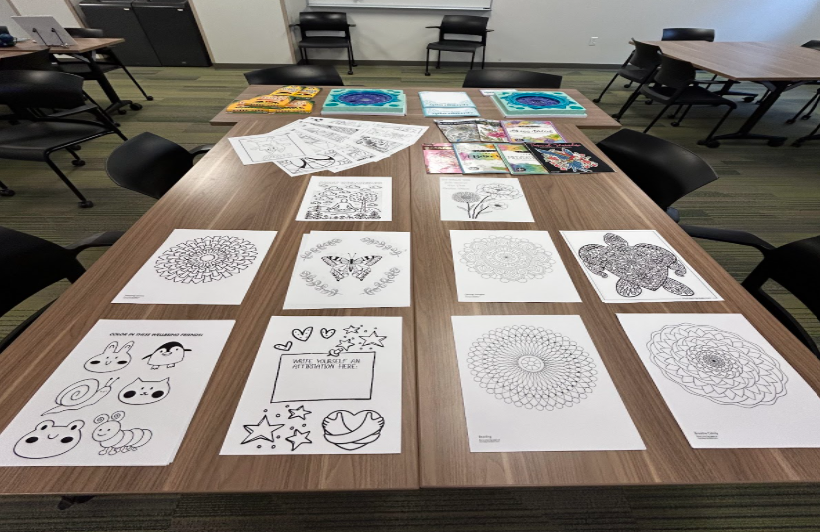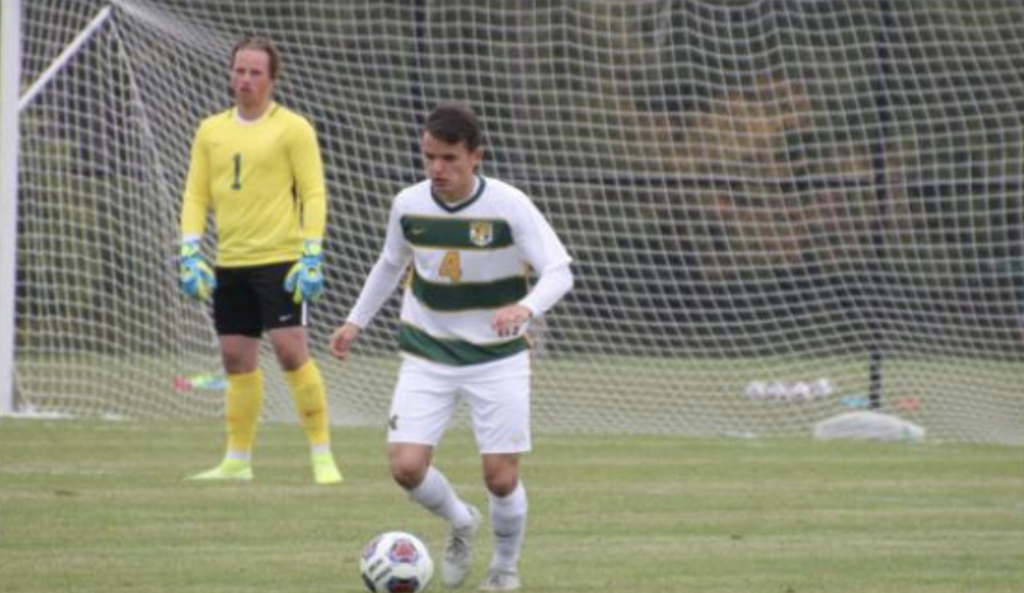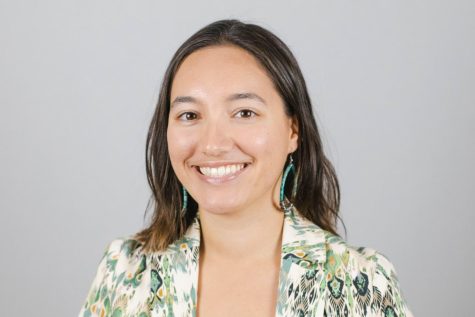Caro Els, a first-year graduate student studying exercise science and a member of the Women’s Golf team, wasn’t planning on attending NMU when she started college at the University of Pretoria in 2016 in Pretoria, South Africa.
However, during her first year on campus, the political climate in South Africa led Els, who is originally from Namibia, to actively search for another university where she could safely continue her studies.
“Things got pretty violent with protests and stuff on our campus, there was a political upset for a bit and so my campus in Victoria was closed for a while,” Els said. “It was too dangerous to go to school and I was back and forth trying to find a school in America to go and study and at the end of the day, NMU made me a really good offer. With the political climate just being horrible I decided to take it. I didn’t even know where Marquette was or what the U.P. was.”
Els, who had been playing golf since she was eight years old and had traveled around the world for golf tournaments, received a scholarship to play golf at NMU and moved to Marquette in the winter of 2017. Although she had no knowledge of the city and had only spoken English for two years prior to moving, she fell in love with Marquette and the people she met both on and off the golf course.
She was hoping to complete her senior year at NMU with an excellent golf season and a celebration surrounded by friends but with the arrival of COVID-19, things didn’t quite work out as planned.
“We played one tournament in the beginning of the year and my senior season was cut short so at first I thought I wasn’t going to have another college eligibility year,” Els said. “I was devastated when all this happened. We were in the middle of our senior season and we were legit on the way down to one of our tournaments in Kentucky and they called us and said ‘oh your season’s canceled.’ And it being one of my last couple tournaments, it was horrible.”
As COVID-19 became a more pervasive issue, Els found herself on a very empty campus and unable to play golf or see her friends.
“Everyone that I met at NMU and my friends all left very suddenly … which was kind of sad because all my friends just left,” Els said. “The first semester we had to go online was pretty tough. It was really hard to transition and everything was so uncertain at the end of that semester. No one really knew what was going to happen with all the COVID-19 stuff and restrictions. It was honestly very hard for me to finish my degree.”
Not only did Els not have her friends around to support her through her final semester but Namibia’s borders closed soon after Michigan shut down and she didn’t have a chance to go back home for the summer.
“My parents were supposed to come up for graduation so that didn’t happen. And then, our borders just opened [Aug. 3] so I haven’t seen them in a full year, since last August. It’s been really long. It’s been really tough, not gonna lie. It’s not been easy. And I don’t really know when I’m going to get to see them because we don’t know how all the traveling restrictions and how all of that is going to work. So I’m hoping to go home over Christmas but we still don’t really know.”
While everyone has been affected by COVID-19 in some way, international athletes have had to deal with the loss of a previous season and uncertainties about how long it will be before they see their families again.
For business management junior and Men’s Soccer player Julius Reis from Germany, the arrival of COVID-19 happened soon after he arrived back from a spring break trip to Punta Cana, Dominican Republic with members of the NMU soccer team. Two practices after they returned, the campus shut down and all classes changed to online formats.
“I stayed here for three or four weeks because in Germany [COVID-19] was even worse at the time so my parents said to wait for a couple weeks,” Reis said. “And then they decided to shut down airports as well and I got scared and I was worried about not getting home and that I’d have to stay here the whole summer. I wanted to see my friends and my family of course so I decided to fly back early. I went back to Germany in March and then I couldn’t play soccer at all because in Germany it was not allowed.”
When he arrived in Germany, Reis had to quarantine with his family for a majority of the time he was there. When he returned to Marquette, he had to quarantine for another two weeks, but he said the situation wasn’t as bad as it sounds.
“When I got back to Germany, everything was shut down so I was not allowed to leave the house unless I had a major reason,” Reis said. “When I arrived here in Marquette one month ago, I have been in quarantine for two weeks. Both times, I dealt with this situation very well since I could either spend time with my family or Isaac and Jonas who both were in quarantine with me. Of course, I am happy to be ‘free’ and to go to classes and practice now.”
Being able to go to practice and play soccer with his friends, including Jonas Vorbau from Germany and Issac Wigermo from Sweden, was one of the main reasons Reis came back to NMU this fall.
“I decided that I have a season in the US for sure because that’s what the coaches told us,” Reis said. “They couldn’t predict it but they said we’ll probably have a season and I hope that we’ll have a season.”
With the way things are currently working with respect to COVID-19, Reis says it’s unlikely that they will have any games this year but he’s glad to be able to practice with the team.
As of Aug. 31, the team has been approved to start practicing in phase one which means no body-contact, technical drills and a focus on individual improvement, according to Reis.
Along with modified practices, Reis will be working with Els and other strength and conditioning coaches at Northern. Els was an intern coach last semester and now prepares workout programs for NMU’s athletes in the Dome weight room to help prevent injuries.
“We actually just started today [Sept. 1] and what they’re doing is since no one is having a season this semester, basically everyone is in offseason so that means we can work with them a little more in the weight rooms which is kind of nice,” Els said. “Because people have been sitting for the last how many months so we’re starting super slow and getting them back to moving well. Most teams are starting practices and stuff soon so basically we’re just trying to get them moving and get them ready again for practice and hopefully prepare them for if we have seasons in January.”
While all sports are uncertain if they will have a tournament season this year, Kjetil Baanerud, senior economics major and member of the men’s Nordic ski team from Norway, is hoping training this fall will eventually lead up to a few races in the winter semester.
“[COVID-19] affects the first couple races of the semester because we’re not allowed to compete before Christmas but then I guess we’ll see what happens when the winter semester starts,” Baanerud said. “I think the chances of the season being canceled are there for sure. I really hope that we get to do some races because that’s what we’re here for.”
For the ski team, training in the fall is almost more important than winter practices. For Baanerud and his team, spending two to three hours a day training is worth it for the possibility of a season.
“It seems like people are motivated, hoping for a season so we’re doing pretty much what we’ve done in the past … for us now, a normal week of training looks like 12 to 20 hours of training,” Baanerud said. “We do more training now than we do in the winter because we don’t have the time when it comes to racing and the impact of racing is too much on our bodies for us to train too much.”
Like Reis, Baanerud had to quarantine for 14 days once he arrived back in Marquette after staying with his family in Oslo over the summer. The experience wasn’t much fun at times he said but was worth it to see his family and maintain a responsibility to keeping everyone safe.
“This summer I was able to go back as soon as we started to have a breakout here in the US which was a little later than Europe. I flew home with a week’s notice,” Baanerud said. “At that time I felt safer being at home than being here regarding the health system and being close to family if something were to happen. So I got to see my family over the summer and then I came back at the start of August when the borders opened again for us international students to come over.”
Even with canceled or restricted sports seasons, quarantines and an uncertain holiday season around the corner, Els and other international athletes are focused on the positive aspects of the situation.
“Since we didn’t have a championship season, [the NCAA] gave us an extra year of eligibility which is like very rare, it hardly happens so it was actually really really cool that they did that for the senior athletes who didn’t have a chance to compete,” Els said. “I found out that I could get another year of eligibility a few months [after the season was canceled] so that all kind of worked out.”




























